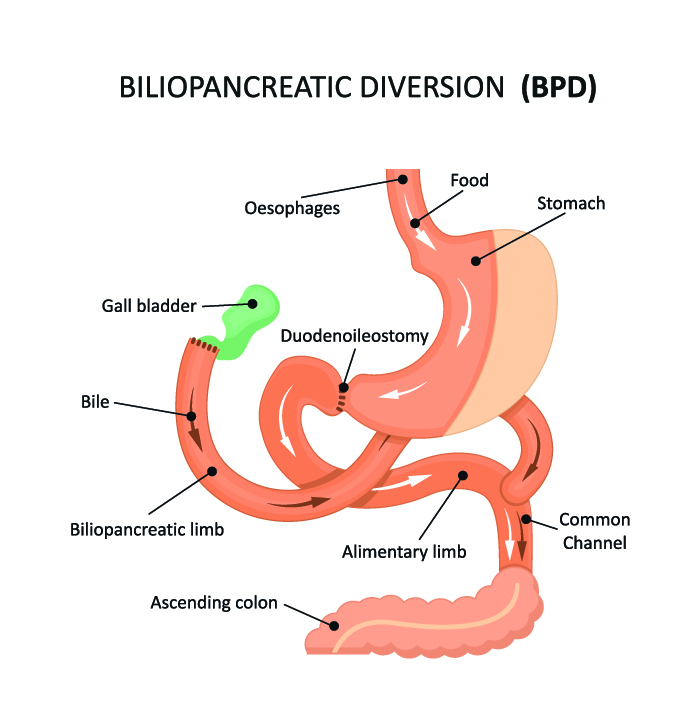Biliopancreatic Diversion Treatment & Diagnostics in Chirag Enclave, Delhi
Biliopancreatic Diversion
A biliopancreatic diversion is a weight loss procedure where the normal digestive process changes with the stomach reduction. This procedure bypasses part of the small intestine to absorb fewer calories—this procedure is intended for people who are more than obese. Super obesity indicates that the BMI is 50 or above.
After the surgery, the patient would feel full quicker than the original stomach size. It lowers the amount of food that the patient wants to eat. Bypassing the intestine part also means consuming fewer calories. It leads to loss of weight.
Two methods for biliopancreatic diversion were conducted: a biliopancreatic diversion and a duodenal biliopancreatic diversion. Most surgeons do not conduct duodenal switch procedures except in super obesity. If you are looking for bariatric surgery, the bariatric surgery doctors in Chirag Enclave can assist you with the appropriate treatment.

About Biliopancreatic Diversion
A duodenal switch (BPD/DS) biliopancreatic diversion is a less frequent weight loss procedure, including two key stages.
The first phase is sleeve gastrectomy, which involves removing around 80% of the stomach, leaving a smaller tube-shaped stomach like a banana. The valve that released food into the small intestine and a limited section of the small intestine, typically connected to the stomach (duodenum), remains.
By linking the intestine's end to the duodenum near the stomach in the second stage, the majority of the intestine bypasses. A BPD/DS both limits food intake and reduces nutrient absorption, particularly fat and protein.
BPD/DS is usually performed as a single procedure. However, the process is generally conducted in two stages - sleeve gastrectomy and intestinal bypass once weight loss starts.
While a BPD/DS is effective, other concerns, including malnutrition and vitamin deficiencies, are associated. Individuals with a body mass index (BMI) of more than 50 are generally recommended for this Procedure.
Who qualifies for Biliopancreatic Diversion?
- Physical issues caused by obesity interfere with one's lifestyle.
- A body size problem negatively impacts social life, job, family function, and ambulation.
- Have tried and failed several times to lose weight using supervised nutritional, behavioral, and medical therapy.
- Recognition and acceptance of operations-related risks.
- You have realistic expectations and are motivated.
Why is Biliopancreatic Diversion Conducted?
A BPD/DS performed to assist you in losing weight and lowering your risk of potentially life-threatening weight-related health issues, such as:
- Infertility
- High Blood pressure
- Coronary heart disease
- Stroke
- Type 2 diabetes
- High cholesterol level
A BPD/DS generally only occurs after you have tried to decrease weight by altering your food and lifestyle.
On the other hand, a BPD/DS is not for all those who are very overweight. You may need to undergo a lengthy screening procedure to find out whether you qualified.
You should also be ready to modify your long-term lifestyle to live a healthy lifestyle before and after surgery. Long-term follow-up plans may involve dietary monitoring, lifestyle and behavioral monitoring, and medical problems.
Benefits of Biliopancreatic Diversion
- When compared to other obesity procedures, this technique ensures the most weight loss. It's also the most long-lasting.
- Significant weight loss. You're looking at 70-80 percent, and in certain situations, 90 percent. It generally happens in the first year after surgery and slows down in the second and later years.
- Dumping syndrome is unlikely to occur (very rare).
- Many other procedures, like gastric bypass, will allow you to consume more prominent and thus more 'normal' sized portions of food.
- This procedure can reduce or cure many obesity-related conditions like Type 2 diabetes, high blood pressure, stroke, sleep apnea, increased cholesterol, asthma, arthritis, back pain, liver, heart disease, and reproductive problems.
- Confidence and well-being have increased. Psychological well-being will improve as well.
Request an appointment at Apollo Spectra Hospitals, Chirag Enclave, Delhi
Call 1860 500 2244 to book an appointment
Risks of Biliopancreatic Diversion
- Ulcers
- Bleeding
- Thrombosis of the deep veins (blood clot)
- Blockage: a swelling of the intestines and stomach that makes swallowing difficult.
- Leakage
- Infection
Although bariatric surgery does not cure diabetes, it does aid in its control. Obesity is a big concern for diabetic people, and bariatric surgery can help them lose weight, which will help them control their diabetes.
Any medical procedure comes with its own set of problems and dangers. As a result, as compared to other weight-loss methods, bariatric surgery has fewer problems and risks. So many doctors recommend losing weight to their patients.
Gastric bypass surgery, often known as bariatric surgery, works by reducing the amount of food consumed by the patient and decreasing nutrient absorption to reduce obesity or overweight. As a result, this surgery is usually irreversible.
Symptoms
Our Top Specialities
NOTICE BOARD
CONTACT US
CONTACT US
 Book Appointment
Book Appointment


.svg)
.svg)
.svg)
.svg)








